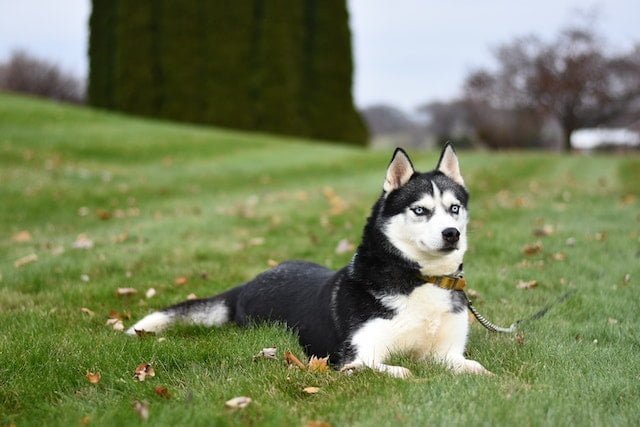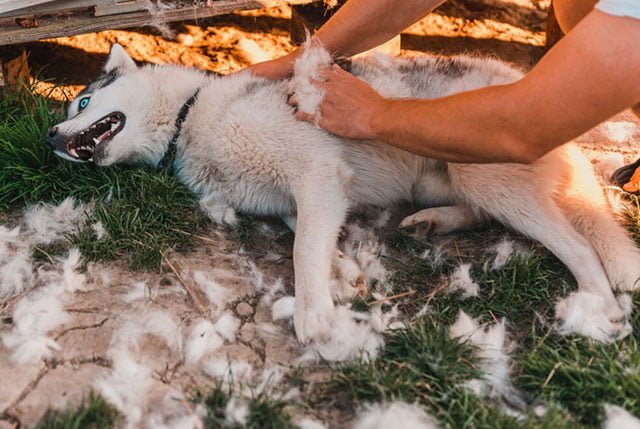Getting rid of fleas on a husky can be a challenging task for many pet owners. These pesky parasites are not only irritating to your furry friend but can also cause various health problems if left untreated. In this article, we will provide you with some effective tips on how to get rid of fleas on your husky and prevent them from coming back.
The first step in getting rid of fleas on your husky is to identify the problem. Symptoms of flea infestation include excessive scratching, red bumps or rashes on the skin, and the presence of flea dirt (black specks) on your pet’s fur. Once you have confirmed that your husky has fleas, it’s important to act quickly to prevent the infestation from spreading.
One of the most effective ways to get rid of fleas on your husky is to use a flea comb. This specialized comb is designed to remove fleas and their eggs from your pet’s fur. It’s important to use a flea comb regularly and to dispose of any fleas or eggs that you find. Additionally, you can use flea shampoos, sprays, and collars to further prevent and treat flea infestations on your husky.

Understanding Fleas
Lifecycle of Fleas
Fleas have a four-stage lifecycle: egg, larva, pupa, and adult. Female fleas lay eggs on their host animal, which then fall off onto the ground. The eggs hatch into larvae, which feed on organic matter in the environment. After several molts, the larvae spin a cocoon and enter the pupal stage. Fleas can remain in the pupal stage for several months, waiting for the right conditions to emerge as adults. Once emerged, adult fleas seek a host to feed on and begin the cycle all over again.
How Fleas Affect Huskies
Fleas can cause a range of health problems for huskies, including skin irritation, hair loss, and anemia. Some huskies may also develop flea allergy dermatitis (FAD), an allergic reaction to flea saliva that can cause intense itching and discomfort. In severe cases, FAD can lead to bacterial skin infections and other complications.
To prevent fleas from affecting your husky, it’s important to understand their lifecycle and take steps to break it. Regular grooming and cleaning of your husky’s environment can help remove fleas and their eggs from your home. Additionally, there are a variety of flea prevention and treatment products available, including topical treatments, oral medications, and flea collars. It’s important to consult with your veterinarian to determine the best flea control plan for your husky.
Prevention of Fleas
Preventing fleas is always better than treating them. In this section, we will discuss some effective ways to prevent fleas from infesting your husky.
Regular Cleaning and Grooming
Regular cleaning and grooming of your husky can go a long way in preventing flea infestations. Here are some tips:
- Brush your husky’s coat regularly to remove dirt and debris that can attract fleas.
- Bathe your husky with a flea shampoo at least once a month.
- Vacuum your home and your husky’s living area regularly to remove fleas and their eggs.
- Wash your husky’s bedding and toys regularly in hot water to kill fleas and their eggs.
- Keep your yard clean and free of debris that can attract fleas.
Use of Flea Preventive Products
There are many flea preventive products available in the market that can help you keep your husky flea-free. Here are some options:
- Flea collars: These collars release chemicals that repel fleas and ticks.
- Topical treatments: These are applied to the skin of your husky and kill fleas and ticks on contact.
- Oral medications: These are pills that your husky can take to kill fleas and ticks from the inside out.
It is important to consult with your veterinarian before using any flea preventive products on your husky. They can recommend the best product for your husky’s specific needs and health condition.
By following these preventive measures, you can keep your husky flea-free and healthy.

Identifying Fleas on Your Husky
Fleas are a common problem for many dog owners, and huskies are no exception. These pesky parasites can cause a lot of discomfort for your furry friend, so it’s important to be able to identify them as soon as possible. Here are some signs that your husky may have fleas:
- Scratching and biting: If your husky is scratching or biting at their skin more than usual, it could be a sign of fleas. Fleas cause irritation and itching, which can lead to excessive scratching and biting.
- Red or irritated skin: Flea bites can cause redness and irritation on your husky’s skin. Look for any areas that seem particularly red or inflamed.
- Flea dirt: Flea dirt is the feces of fleas and looks like small black specks. You may be able to see this on your husky’s skin or fur, especially around the tail and back end.
- Visible fleas: In some cases, you may be able to see actual fleas on your husky’s skin or fur. These are small, brown insects that move quickly.
If you suspect that your husky has fleas, it’s important to take action right away. Fleas can quickly multiply and spread to other areas of your home, so it’s best to address the problem as soon as possible.
Immediate Flea Treatment
If your husky has fleas, it’s important to act quickly to prevent the infestation from spreading. Here are two immediate flea treatment options to consider:
Flea Shampoos and Sprays
Flea shampoos and sprays are a popular choice for immediate flea treatment. These products work by killing fleas on contact and can provide immediate relief for your dog. When using flea shampoos and sprays, it’s important to follow the instructions carefully and to avoid getting the product in your dog’s eyes or mouth.
Here are some tips for using flea shampoos and sprays:
- Wet your dog thoroughly before applying the product.
- Apply the product to your dog’s fur, making sure to cover all areas.
- Massage the product into your dog’s fur and skin.
- Allow the product to sit for the recommended amount of time before rinsing it off.
- Use a flea comb to remove any dead fleas from your dog’s fur.
Oral Medications
Oral medications are another option for immediate flea treatment. These medications work by killing fleas when they bite your dog. Oral medications are generally safe and effective, but it’s important to follow the instructions carefully and to watch for any side effects.
Here are some tips for using oral medications:
- Talk to your veterinarian to determine the best medication for your dog.
- Follow the dosage instructions carefully.
- Watch for any side effects, such as vomiting, diarrhea, or loss of appetite.
- Monitor your dog for any signs of improvement or worsening of the flea infestation.
Remember, these treatments are only a temporary solution to the problem. It’s important to also take steps to prevent future flea infestations, such as regularly grooming your dog, vacuuming your home, and using flea preventatives.
Long-Term Flea Control
Maintaining a Clean Environment
To prevent fleas from infesting your husky, it is important to keep a clean environment. This includes vacuuming carpets, rugs, and furniture regularly to remove flea eggs and larvae. It is also important to wash your husky’s bedding and toys frequently in hot water to kill any fleas or eggs that may be present.
In addition, it is important to keep your yard and outdoor areas clean and free of debris. Fleas thrive in warm, moist environments, so it is important to remove any standing water, piles of leaves or grass clippings, or other potential breeding grounds for fleas.
Regular Vet Check-Ups
Regular check-ups with your vet are essential for long-term flea control. Your vet can recommend the best flea prevention products for your husky based on their age, weight, and overall health. They can also check for any signs of flea infestation and provide treatment if necessary.
In addition, your vet can provide advice on how to prevent other health issues that can be caused by fleas, such as tapeworms and skin infections. Regular check-ups can help ensure that your husky stays healthy and flea-free for the long term.
Conclusion
In conclusion, getting rid of fleas on a husky can be a challenging task, but it is not impossible. We have discussed various methods that can be used to eliminate fleas from your husky.
Firstly, it is important to maintain proper hygiene by regularly bathing your husky with a flea shampoo and combing their fur with a flea comb. This will help to remove any fleas and their eggs from your husky’s coat. Additionally, vacuuming your home regularly and washing your husky’s bedding can help to eliminate fleas from your home environment.
Secondly, using flea prevention products such as flea collars, topical treatments, and oral medications can help to prevent fleas from infesting your husky. It is important to consult with your veterinarian to determine the best flea prevention product for your husky.
Lastly, if your husky has a severe flea infestation, it may be necessary to seek professional help from a veterinarian or a pest control service. They can provide specialized treatments to eliminate fleas from your husky and your home.
Overall, the key to getting rid of fleas on a husky is to be consistent with your flea prevention and elimination methods. By following the tips and methods discussed in this article, you can help to keep your husky flea-free and healthy.

Frequently Asked Questions
What is the best flea treatment for dogs?
There are many flea treatments available for dogs, including topical treatments, oral medications, and flea collars. The best flea treatment for your husky will depend on their individual needs and your veterinarian’s recommendations. Some popular options include Frontline, Advantage, and Bravecto.
What kills fleas on dogs the fastest?
A flea bath or dip can quickly kill fleas on a dog’s coat. However, these treatments are not always effective at preventing future infestations. Oral medications like Capstar can also quickly kill fleas, but again, they do not provide long-term protection. For effective long-term flea control, a monthly preventative like Frontline or Advantage is recommended.
What does flea dirt look like on a husky?
Flea dirt is the feces of adult fleas and appears as small black specks on a dog’s coat. On a husky, flea dirt may be visible on their white or light-colored fur. To determine if the specks are flea dirt, place them on a damp paper towel. If they turn red, it is likely flea dirt as it contains digested blood.
Can fleas live on huskies?
Yes, fleas can live on huskies just like any other dog breed. Huskies are not immune to fleas and can become infested if not properly treated with flea preventatives.
Do huskies get fleas easily?
Huskies can get fleas just as easily as any other dog breed. However, their thick coat may make it more difficult to spot fleas or flea dirt. Regular grooming and flea prevention can help prevent infestations.
Do huskies get ticks?
Yes, huskies can get ticks just like any other dog breed. Ticks can be found in wooded areas or tall grass and can attach to a husky’s fur as they brush by. Regular tick checks and preventative measures can help protect your husky from tick-borne diseases.





